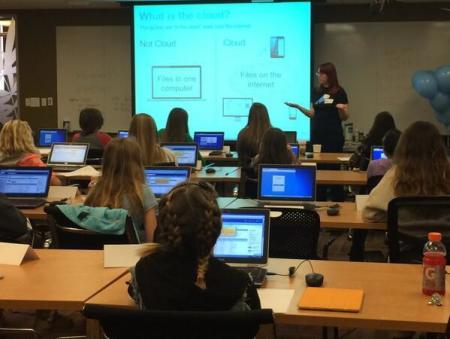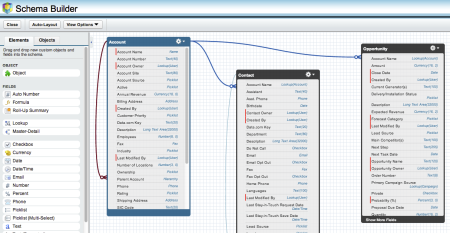 This series highlights women developers, to raise their visibility and break down some of the unconscious biases that block the path of women and people of color when it comes to technology jobs. I encourage you to share these stories, and your own, with someone who doesn’t “fit” the stereotype of a programmer. In this small way, we can change the ratio.
This series highlights women developers, to raise their visibility and break down some of the unconscious biases that block the path of women and people of color when it comes to technology jobs. I encourage you to share these stories, and your own, with someone who doesn’t “fit” the stereotype of a programmer. In this small way, we can change the ratio.
Carolyn Grabill first thought she’d be a teacher, and then she knew she’d work with computers. Turns out she was right about both. As a Senior Member of Technical Staff at salesforce.com, she programs the Salesforce Platform tools that let business analysts and developers build business apps. In her free time, she teaches girls to code. I asked her to share her story.
When did you learn to code? What do you love about it?
I learned to code using the “gateway drug” of HTML. When I was in high school, I had a website dedicated to things I was a fan of. I was very excited to learn HTML and CSS and put my ideas on the internet. I think every teenager wants to connect with people who have similar interests.
I didn’t learn to program in actual programming languages until college, but I always knew I was going to major in Computer Science or something similar. When I was a kid, I always spent time on the computer doing things I thought were fun. I thought making calendars in Excel and making Powerpoint presentation was fun. My mom always worked with computers – I didn’t know what she did, but I always thought that I would work with computers.
When I was really little, before I was aware of computer jobs, I thought I would be a teacher. I really like teaching, and whenever there’s an opportunity for me to talk about what I do or to teach kids to code, I take it. I want kids to feel like I did when I was little: “Oh yeah, obviously programming is the best job!”
I love the instant gratification of programming. I love making a change, and then running my code and seeing the difference. That instant gratification gives me a little endorphin boost.
You recently taught kids to code at salesforce.com’s Bring Your Daughters to Work Day. Tell me about that.
On April 24, 2014, the Salesforce Women in Technology group hosted 22 girls during Bring Your Daughters To Work Day. The day included a two-hour class on building an app, followed by an office tour. I developed the curriculum and taught the Salesforce Platform class. I taught the girls what the Salesforce Platform is, who uses it, and what is it good for.
I think they really learned the lesson what I wanted to convey to them, which is the Salesforce Platform is really good for keeping lists of things. When you boil it down to that, it’s really easy for kids to understand what a database is. We built a Party Planning app. When one of the kids asked, “How would I invite the same guest to more than one party?”, I knew they had gotten to the point where they understood what I was teaching and were ready for more.

What other opportunities have you had to teach kids to code?
I heard from a colleague that sf.girls( ) needed a last-minute replacement for their panel. What? A chance to talk to kids about programming? I signed up immediately!
It was fun! I went to Buena Vista Horace Mann, a bilingual (English/Spanish) middle school in the Mission in San Francisco. We had a networking lunch with the kids, organized in roundtables with mentors, and I was one of the mentors. We talked about careers and being a women in technology. Later on, we had a panel where the mentors talked about their experience of being a woman in technology.
I was probably the youngest panelist. Other women told stories from the front lines of being the first woman in a company, and how these girls will be the only woman at some point and they, too, will need to build bridges for the women who come after them. [Watch the video here.]
The other thing that was really interesting about that event was that the school was able to put on an event only for girls. That was important because the entire student body had to get the message that this feminism thing is really a thing. This is a problem that we are still working on, and there are times and places where, when you’re not the group that’s being addressed, it’s important to step back, and that shows respect and understanding for the problem.
What is it like being a woman in technology?
Most of the time I don’t think about it. I feel like I’m very fortunate to have been welcomed into Salesforce by a woman manager, and her manager was a woman, and the Product Manager was also a woman and I was on a team with other women. I think the department I work in has a better ratio of women to men than other companies. I’ve never been the only woman on a team, but I’m young – I’m sure that will happen. I am mentally preparing for that eventuality.
How long have you been at Salesforce? What is your role?
It will be three years this June. My first Salesforce Platform experience was as a college intern at one of Salesforce’s customers. I worked in their IT department as an Apex Code developer. I did not know Apex, but I knew Java, and Apex is similar to Java, so they taught me on the job.
After that, I thought, “This Salesforce Platform thing is really awesome, I would really love to work for that company.” I got my chance when I attended the Grace Hopper Celebration of Women in Computing Conference. I had attended Vassar, which is a liberal arts college, so this was my chance to meet tech recruiters.
When I arrived, resume in hand, I went straight to the salesforce.com table. I handed my resume to the woman who would end up being my manager, Lucia de Lascurain. I told her I had a friend, Cordelia McGee-Tubb, who interned at Salesforce. I saw Lucia write “knows Cordelia” on my resume – turns out Lucia had been Cordelia’s manager! I got hired, and the past two years I’ve returned to Grace Hopper to recruit more women into our engineering team.
I work on the Custom Schema team, which is responsible for Custom Fields and Objects. I also worked on the teams that brought State & Country as a Picklist to life, and the Schema Builder. It is really rewarding to work on something that so many people use.

What programming languages do you use? Do you ever write Apex/Visualforce?
I program primarily in Java, also SQL, and sometimes Javascript. I’m very excited when I have the opportunity to use Apex Code and Visualforce. It’s much easier than other platforms. The hardest part of getting software started is setting up your development environment, but with the Salesforce Platform, the environment and compiler are already set up for you.
I’ve done two projects using Apex and Visualforce, as part of our PTON (Paid Time On) program. The program allows for paid “time on” to focus on personal coding projects.
I’ve met many Salesforce Admins who are interested in learning to code. What is your advice to them?
Apex Code is easier to learn as a first programming language because the environment is set up for you. Start with writing Apex Triggers. Find a business process you wish your Salesforce instance could do for you. Odds are you can do it with Apex. Start by Googling code samples for what you want to do.
And if (when) you have questions, the odds are good that those questions have been asked before on the Discussion Forums. Personally, I am a fan of the Salesforce StackExchange community. I go there when I want to turn my Salesforce experience into good karma. You can post your code and people will help you point out the missing semi-colons and logic errors. The Salesforce StackExchange is designed for asking a question that has one answer, and the Discussion Forums have more of discussion format.
You presented at Dreamforce ’13. How was that?
I loved speaking at Dreamforce! I really like getting on stage and talking to people about things that I do. I used the example of my PTON project, “Lunchforce”, to talk about Custom Junction Objects and Posting to Chatter from Apex – two features which are baked right into the platform but are underutilized. The point of Lunchforce is to match up people who might not otherwise meet at work, so they can have lunch. I use Chatter Groups and Scheduled Apex as a way to manage the members and the lunch matches.
The session is recorded, and I saw it posted on Twitter once as an example of “Here’s how you make a Chatter post from Apex – listen to Carolyn’s presentation and it will be really easy to learn.” That was very gratifying!
What do you do in your free time (if you have any)?
I play a lot of League of Legends. I at level 22 and I’m working on getting into ranked play at level 30. League of Legends is an online battle arena game, with teams of 5 competing against each other. You get to pick a “champion” character to play as, and each with their own play style. There’s a lot of variety in ways teams can work together to win, which makes it a very strategic game.
Author’s Note
Cordelia also works at salesforce.com, and she’s pretty awesome, too. Check out her she++ story here.
Dreamforce ’14 Call for Presentations is open. Check it out and submit your session idea today. I want to see more women on stage this year, so if you want to brainstorm topics or need help with your application, email me: mscotton@salesforce.com.
Looking for me on Twitter? I’m @rockchick322004, and I tweet about the Salesforce1 Platform and Women in Tech.